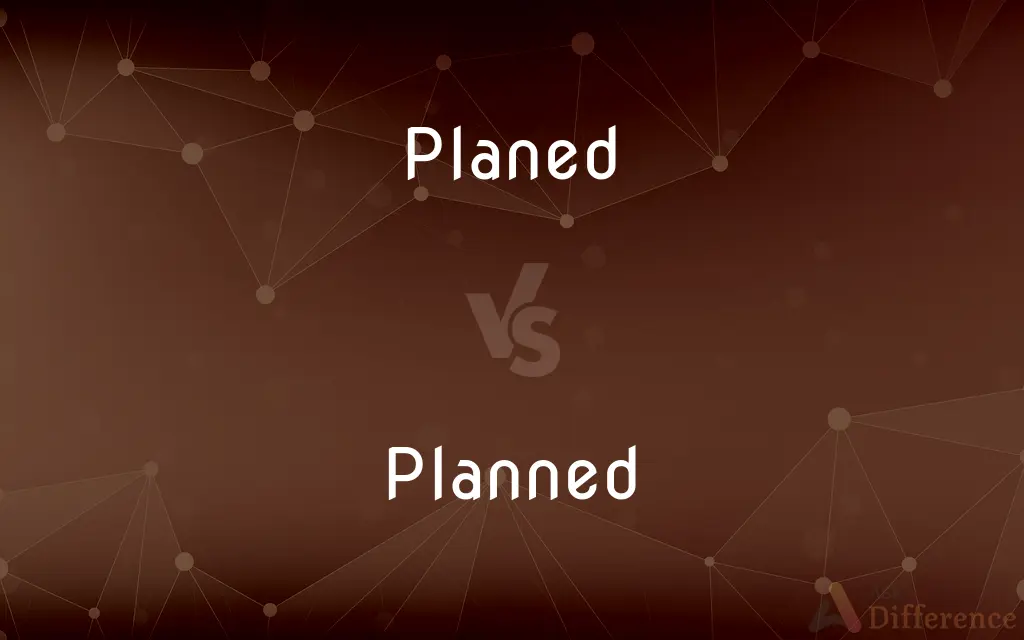Planed vs. Planned — What's the Difference?
By Fiza Rafique & Urooj Arif — Updated on March 17, 2024
Planed refers to smoothing or shaping wood with a plane, while planned indicates having made preparations or devised a strategy in advance.

Difference Between Planed and Planned
Table of Contents
ADVERTISEMENT
Key Differences
Planed is a verb that specifically relates to the use of a plane, a tool for shaping or smoothing wood surfaces. It involves the physical action of removing layers from wood to achieve a desired texture or shape, emphasizing the craft and precision in woodworking. Whereas, planned is the past tense of plan, referring to the process of designing, strategizing, or preparing for future activities or projects. This verb is used across various contexts, from daily schedules to complex projects, highlighting the importance of foresight and organization.
While planed is exclusively used in the context of woodworking or similar activities where material is being shaped or finished, planned can be applied to a vast array of situations where mental preparation or strategic thinking is required. For instance, planning a trip involves considering logistics, activities, and goals, as opposed to the physical act of planing wood.
The result of planing is a smooth, even wood surface, ready for further construction or finishing touches. On the other hand, the outcome of planning is a conceptual plan or strategy, which could manifest as a schedule, a project outline, or a list of objectives. This distinction highlights the difference between physical preparation and mental or logistical preparation.
Planed and planned also differ in their tools and outputs. Planing requires a physical tool (a plane) and directly alters the physical state of a material. Planning, however, often involves abstract tools such as lists, diagrams, or software applications, aiming to organize thoughts, actions, or resources.
Despite their differences, both actions are preparatory in nature but apply to different domains: planed to the tactile, physical world of craftsmanship, and planned to the abstract, strategic realm of thought and organization. This distinction underlines the importance of context when choosing between these similarly spelled words.
ADVERTISEMENT
Comparison Chart
Definition
Refers to smoothing or shaping wood with a plane.
Indicates having made preparations or devised a strategy in advance.
Context
Woodworking and material finishing.
Any planning or preparation activity.
Outcome
A smooth, even wood surface.
A plan, strategy, or schedule.
Tools Used
A physical tool (a plane).
Abstract tools (lists, diagrams, software).
Nature of Action
Physical alteration of materials.
Mental or logistical organization.
Compare with Definitions
Planed
Used in woodworking to achieve a desired texture or shape.
The carpenter carefully planed the edges to make them smooth.
Planned
Results in a conceptual plan or strategy.
Their vacation was planned with attention to every detail.
Planed
To smooth or shape wood with a plane tool.
He planed the door to ensure it fit perfectly in the frame.
Planned
Can be applied to a wide range of situations.
We planned a surprise party for her birthday.
Planed
Results in a physical alteration of the wood's surface.
The table top was planed to a flawless finish.
Planned
Involves considering logistics, activities, and goals.
He planned the project phases to ensure timely completion.
Planed
Focuses on the craft and precision in woodworking.
Skillfully planed wood pieces were assembled into a beautiful piece of furniture.
Planned
Refers to the organization of future activities or projects.
The conference was carefully planned to cover all topics of interest.
Planed
Involves removing layers from wood.
After planing the surface, it was ready for varnishing.
Planned
Having made preparations or devised a strategy in advance.
They had planned their route to avoid traffic.
Planed
A carpenter's tool with an adjustable blade for smoothing and leveling wood.
Planned
An orderly or step-by-step conception or proposal for accomplishing an objective
A plan for improving math instruction.
Planed
A trowel-shaped tool for smoothing the surface of clay, sand, or plaster in a mold.
Planned
A proposed or intended course of action
Had no plans for the evening.
Planed
To smooth or finish with a plane
Planed the door.
Planned
A systematic arrangement of elements or important parts; a configuration or outline
A seating plan.
The plan of a story.
Planed
To remove with a plane
Plane off the rough edges on a board.
Planned
A drawing or diagram made to scale showing the structure or arrangement of something.
Planed
To work with a plane.
Planned
In perspective rendering, one of several imaginary planes perpendicular to the line of vision between the viewer and the object being depicted.
Planed
To rise partly out of the water, as a hydroplane does at high speeds.
Planned
A program or policy stipulating a service or benefit
A pension plan.
Planed
To soar or glide.
Planned
To formulate a scheme or program for the accomplishment, enactment, or attainment of
Plan a campaign.
Planed
To travel by airplane.
Planned
To have as a specific aim or purpose; intend
They plan to buy a house.
Planed
Simple past tense and past participle of plane
Planned
To draw or make a graphic representation of.
Planned
To make plans.
Planned
Simple past tense and past participle of plan
Planned
Existing or designed according to a plan.
Planned
At or through the planning stage, but not yet implemented or started.
Planned
Designed or carried out according to a plan;
The planned outlays for new equipment
Planned
Planned in advance;
With malice aforethought
Common Curiosities
What might be involved in creating a planned schedule?
Considering various tasks, their priorities, deadlines, and how they fit together over time.
How is "planned" used in a sentence?
As the past tense of plan, indicating that preparation or strategy was made in advance.
How does the outcome of planing compare to planning?
Planing results in a tangible, altered physical object, whereas planning results in an intangible strategy or outline.
What does it mean to plane wood?
To smooth or shape it using a tool called a plane, removing layers for a desired finish.
How can technology aid in planning?
Through planning software, apps, and tools that organize information, track progress, and facilitate decision-making.
Can "planed" be used outside of woodworking?
Typically, it's specific to the context of woodworking and similar material-finishing activities.
Is there a scenario where "planed" and "planned" could be used together?
Yes, in the context of woodworking projects. For example, "He planed the wood for the shelves he had planned to build in his living room."
What skills are required for effective planing of wood?
Manual dexterity, an understanding of wood properties, and experience with woodworking tools.
Why is planning important?
It helps organize thoughts, actions, and resources to achieve a goal efficiently and effectively.
Can planning be applied to personal goals?
Yes, planning is crucial for setting, organizing, and achieving personal goals.
Can someone plan without writing anything down?
Yes, mental planning is common, but documenting plans can help clarify thoughts and communicate with others.
Why might someone choose to plane wood manually instead of using power tools?
For precision, control, and the satisfaction of traditional craftsmanship, or when working with delicate pieces.
What distinguishes a plan from a strategy?
A plan is a set of organized steps to achieve a goal, while a strategy is a broader approach or methodology behind the choices made within those plans.
Is planning always successful?
While planning aims to anticipate and prepare for future events, changes and unforeseen circumstances can affect outcomes.
How does the quality of wood affect planing?
The type, grain, and condition of wood can significantly impact the ease of planing and the quality of the finish.
Share Your Discovery

Previous Comparison
Separate vs. Separately
Next Comparison
Evil vs. AgathokakologicalAuthor Spotlight
Written by
Fiza RafiqueFiza Rafique is a skilled content writer at AskDifference.com, where she meticulously refines and enhances written pieces. Drawing from her vast editorial expertise, Fiza ensures clarity, accuracy, and precision in every article. Passionate about language, she continually seeks to elevate the quality of content for readers worldwide.
Co-written by
Urooj ArifUrooj is a skilled content writer at Ask Difference, known for her exceptional ability to simplify complex topics into engaging and informative content. With a passion for research and a flair for clear, concise writing, she consistently delivers articles that resonate with our diverse audience.
















































